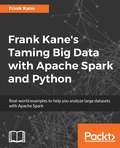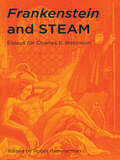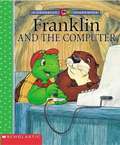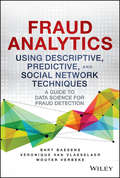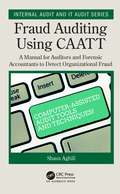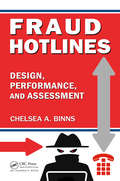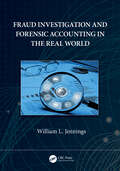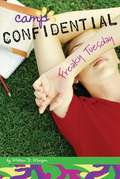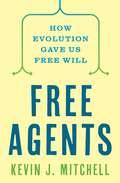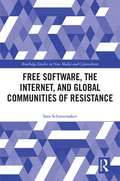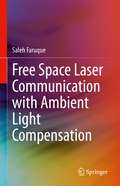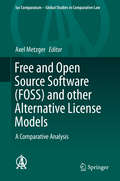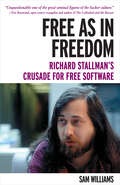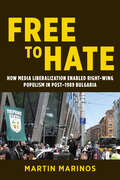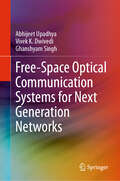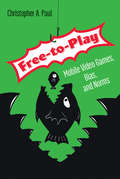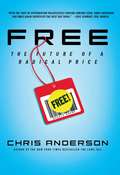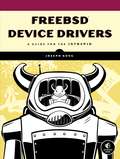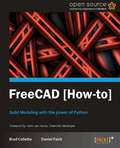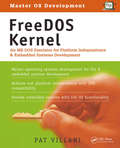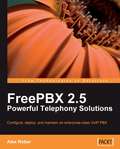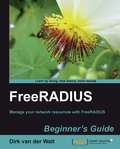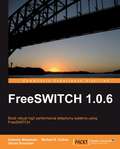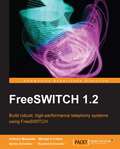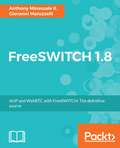- Table View
- List View
Frank Kane's Taming Big Data with Apache Spark and Python
by Frank KaneFrank Kane's hands-on Spark training course, based on his bestselling Taming Big Data with Apache Spark and Python video, now available in a book. Understand and analyze large data sets using Spark on a single system or on a cluster. About This Book • Understand how Spark can be distributed across computing clusters • Develop and run Spark jobs efficiently using Python • A hands-on tutorial by Frank Kane with over 15 real-world examples teaching you Big Data processing with Spark Who This Book Is For If you are a data scientist or data analyst who wants to learn Big Data processing using Apache Spark and Python, this book is for you. If you have some programming experience in Python, and want to learn how to process large amounts of data using Apache Spark, Frank Kane's Taming Big Data with Apache Spark and Python will also help you. What You Will Learn • Find out how you can identify Big Data problems as Spark problems • Install and run Apache Spark on your computer or on a cluster • Analyze large data sets across many CPUs using Spark's Resilient Distributed Datasets • Implement machine learning on Spark using the MLlib library • Process continuous streams of data in real time using the Spark streaming module • Perform complex network analysis using Spark's GraphX library • Use Amazon's Elastic MapReduce service to run your Spark jobs on a cluster In Detail Frank Kane's Taming Big Data with Apache Spark and Python is your companion to learning Apache Spark in a hands-on manner. Frank will start you off by teaching you how to set up Spark on a single system or on a cluster, and you'll soon move on to analyzing large data sets using Spark RDD, and developing and running effective Spark jobs quickly using Python. Apache Spark has emerged as the next big thing in the Big Data domain – quickly rising from an ascending technology to an established superstar in just a matter of years. Spark allows you to quickly extract actionable insights from large amounts of data, on a real-time basis, making it an essential tool in many modern businesses. Frank has packed this book with over 15 interactive, fun-filled examples relevant to the real world, and he will empower you to understand the Spark ecosystem and implement production-grade real-time Spark projects with ease. Style and approach Frank Kane's Taming Big Data with Apache Spark and Python is a hands-on tutorial with over 15 real-world examples carefully explained by Frank in a step-by-step manner. The examples vary in complexity, and you can move through them at your own pace.
Frankenstein and STEAM: Essays for Charles E. Robinson
by Brian Bates Susan J. Wolfson Mark A. McCutcheon Lisa Crafton Siobhan Watters Lisbeth Chapin L. Adam Mekler Robin HammermanCharles E. Robinson, Professor Emeritus of English at The University of Delaware, definitively transformed study of the novel Frankenstein with his foundational volume The Frankenstein Notebooks and, in nineteenth century studies more broadly, brought heightened attention to the nuances of writing and editing. Frankenstein and STEAM consolidates the generative legacy of his later work on the novel's broad relation to topics in science, technology, engineering, arts, and mathematics (STEAM). Seven chapters written by leading and emerging scholars pay homage to Robinson's later perspectives of the novel and a concluding postscript contains remembrances by his colleagues and students. This volume not only makes explicit the question of what it means to be human, a question Robinson invited students and colleagues to examine throughout his career, but it also illustrates the depth of the field and diversity of those who have been inspired by Robinson's work. Frankenstein and STEAM offers direction for continuing scholarship on the intersections of literature, science, and technology. Published by the University of Delaware Press. Distributed worldwide by Rutgers University Press.
Franklin and the Computer
by Paulette BourgeoisFranklin is totally into Beaver's new computer game, Dam Builders. He keeps popping up at her house and spends all his time playing Dam Builders. He's so obsessed with reaching the next level in the game that he turns down Beaver's invitation to go swimming and even forgets his promise to Bear to show up for soccer practice--twice. One day Franklin finds himself alone; all his friends are at the pond. They are glad when Franklin joins them for a real game of dam builders, and Franklin realizes that friends are the most fun of all. Picture descriptions added.
Fraud Analytics Using Descriptive, Predictive, and Social Network Techniques
by Bart Baesens Veronique Van Vlasselaer Wouter VerbekeDetect fraud earlier to mitigate loss and prevent cascading damage Fraud Analytics Using Descriptive, Predictive, and Social Network Techniques is an authoritative guidebook for setting up a comprehensive fraud detection analytics solution. Early detection is a key factor in mitigating fraud damage, but it involves more specialized techniques than detecting fraud at the more advanced stages. This invaluable guide details both the theory and technical aspects of these techniques, and provides expert insight into streamlining implementation. Coverage includes data gathering, preprocessing, model building, and post-implementation, with comprehensive guidance on various learning techniques and the data types utilized by each. These techniques are effective for fraud detection across industry boundaries, including applications in insurance fraud, credit card fraud, anti-money laundering, healthcare fraud, telecommunications fraud, click fraud, tax evasion, and more, giving you a highly practical framework for fraud prevention. It is estimated that a typical organization loses about 5% of its revenue to fraud every year. More effective fraud detection is possible, and this book describes the various analytical techniques your organization must implement to put a stop to the revenue leak. Examine fraud patterns in historical data Utilize labeled, unlabeled, and networked data Detect fraud before the damage cascades Reduce losses, increase recovery, and tighten security The longer fraud is allowed to go on, the more harm it causes. It expands exponentially, sending ripples of damage throughout the organization, and becomes more and more complex to track, stop, and reverse. Fraud prevention relies on early and effective fraud detection, enabled by the techniques discussed here. Fraud Analytics Using Descriptive, Predictive, and Social Network Techniques helps you stop fraud in its tracks, and eliminate the opportunities for future occurrence.
Fraud Auditing Using CAATT: A Manual for Auditors and Forensic Accountants to Detect Organizational Fraud (Internal Audit and IT Audit)
by Shaun AghiliThis book discusses various common occupational and organizational fraud schemes, based on the Association of Certified Fraud Examiners (ACFE) fraud tree and assist fraud examiners and auditors in correctly choosing the appropriate audit tests to uncover such various fraud schemes. The book also includes information about audit test red flags to watch out for, a list of recommended controls to help prevent future fraud related incidents, as well as step-by-step demonstrations of a number of common audit tests using IDEA® as a CAATT tool.
Fraud Hotlines: Design, Performance, and Assessment
by Chelsea A. BinnsThis book provides a complete guide on fraud hotlines. It is designed to educate readers with respect to the history, purpose, operation, use and utility of fraud hotlines. It also equips readers with the knowledge to create, analyze and assess the performance of fraud hotlines.
Fraud Investigation and Forensic Accounting in the Real World
by William L. JenningsThis book covers every aspect of forensic accounting, anti-fraud control systems, and fraud investigations. The author uses his own case experience to guide the reader through each phase of a forensic accounting assignment and fraud investigation. The book opens with an explanation of what happened to a company that was ensnared in a huge commodity purchasing scheme. Using his knowledge and experience gained over 40 years, the author illustrates that unexpected fraud occurrences can happen to any company, in any industry. Additionally, the author explains the current white-collar crime threats that organizations face every day, as well as legal issues that are often implicated in forensic accounting and fraud investigation projects. Electronic and non-electronic evidence gathering is also covered in detail with illustrative examples. One chapter is devoted entirely to the often misunderstood, but extremely important, subject of witness interviews. It provides the correct approach to the analysis and correlation of evidence in determining findings and conclusions of an investigation. Another chapter is devoted to proper report writing. The author provides detailed guidance on presenting findings to a variety of audiences, including management, a board, law enforcement, and at trials and hearings. It also covers proper techniques for measuring economic damages and concludes with a useful index. William L. Jennings is a Senior Director at Delta Consulting Group. He is responsible for providing forensic accounting, investigation, and asset recovery services to corporations, government agencies, attorneys, and their clients, as well as business controls consulting services to organizations. With more than 40 years of experience in public accounting and auditing, forensic accounting, business valuation, investigation, asset recovery, and business controls development, Mr. Jennings has worked on hundreds of forensic accounting and investigation assignments and he provides expert testimony.
Freaky Tuesday (Camp Confidential #17)
by Melissa J. MorganBrynn's just transferred to a brand-new school in a town close by. A town in Bizarro World, that is, where academic excellence is the fast track to popularity and Candace yes, quiet, seemingly insecure Candace is the reigning queen bee.
Free Agents: How Evolution Gave Us Free Will
by Kevin J. MitchellAn evolutionary case for the existence of free willScientists are learning more and more about how brain activity controls behavior and how neural circuits weigh alternatives and initiate actions. As we probe ever deeper into the mechanics of decision making, many conclude that agency—or free will—is an illusion. In Free Agents, leading neuroscientist Kevin Mitchell presents a wealth of evidence to the contrary, arguing that we are not mere machines responding to physical forces but agents acting with purpose.Traversing billions of years of evolution, Mitchell tells the remarkable story of how living beings capable of choice arose from lifeless matter. He explains how the emergence of nervous systems provided a means to learn about the world, granting sentient animals the capacity to model, predict, and simulate. Mitchell reveals how these faculties reached their peak in humans with our abilities to imagine and to be introspective, to reason in the moment, and to shape our possible futures through the exercise of our individual agency. Mitchell&’s argument has important implications—for how we understand decision making, for how our individual agency can be enhanced or infringed, for how we think about collective agency in the face of global crises, and for how we consider the limitations and future of artificial intelligence.An astonishing journey of discovery, Free Agents offers a new framework for understanding how, across a billion years of Earth history, life evolved the power to choose, and why it matters.
Free Software, the Internet, and Global Communities of Resistance: Hacking the Global (Routledge Studies in New Media and Cyberculture)
by Sara SchoonmakerThis book explores software's pivotal role as the code that powers computers, mobile devices, the Internet, and social media. Creating conditions for the ongoing development and use of software, including the Internet as a communications infrastructure, is one of the most compelling issues of our time. Free software is based upon open source code, developed in peer communities as well as corporate settings, challenging the dominance of proprietary software firms and promoting the digital commons. Drawing upon key cases and interviews with free software proponents based in Europe, Brazil and the U.S., the book explores pathways toward creating the digital commons and examines contemporary political struggles over free software, privacy and civil liberties on the Internet that are vital for the commons' continued development.
Free Space Laser Communication with Ambient Light Compensation
by Saleh FaruqueThis book addresses 5G network capacity requirements with a new architecture for 5G Optical Backhaul Network. The author first describes the challenges for 5G backhaul network requirements and then the details of an Optical Backhaul Network for 5G. The author describes an architecture, in which small cells deploy as a cluster (i.e., 3-5 small cells in one cluster), where one small cell works as an aggregation point using an optical transceiver to backhaul the aggregated traffic to the nearest optical network unit, before it then goes to the core network. This book also illustrates the optical link budget analysis that can be used to determine the availability and the performances of the optical backhaul link in different deployment scenarios and different weather conditions. Provides a single-source reference to the basics of free space laser communication with ambient light compensation;Offers timely information, blending theory and practice;Written to be accessible to readers with varying backgrounds, including numerous illustrations;Provides hands-on experience through practical examples, which can be put to work to deploy and optimize cellular networks.
Free and Open Source Software (FOSS) and other Alternative License Models
by Axel MetzgerThis book discusses the main legal questions raised by free and open source software (FOSS) licenses and other alternative license models, such as Creative Commons. The legal questions raised by FOSS and other alternative licenses have been the subject of an intense international debate among legal scholars and practising lawyers in the last years. Courts in different jurisdictions have confirmed that the core features of FOSS licenses are compliant with the respective applicable laws and thus enforceable in the respective jurisdictions. What is still missing so far is an in-depth comparative analysis of the legal issues raised by FOSS, Creative Commons and other alternative license on a worldwide scale. This book presents a general report on FOSS licenses and alternative license models to establish common ground and enable comparison between jurisdictions. The general report is followed by 24 national reports covering the world's most important IT-markets. General and national reports use the same structure to facilitate the comparison. The book shows that despite the differences in their origins, all FOSS projects use detailed licenses for the organisation of their communities. It also shows the differences in the proofing of these licenses by courts in some jurisdictions and the tailor-made provisions established by some legislators to solve the legal issues raised by the license model.
Free as in Freedom [Paperback]: Richard Stallman's Crusade for Free Software
by Sam WilliamsFree as in Freedom interweaves biographical snapshots of GNU project founder Richard Stallman with the political, social and economic history of the free software movement. It examines Stallman's unique personality and how that personality has been at turns a driving force and a drawback in terms of the movement's overall success.Free as in Freedom examines one man's 20-year attempt to codify and communicate the ethics of 1970s era "hacking" culture in such a way that later generations might easily share and build upon the knowledge of their computing forebears. The book documents Stallman's personal evolution from teenage misfit to prescient adult hacker to political leader and examines how that evolution has shaped the free software movement. Like Alan Greenspan in the financial sector, Richard Stallman has assumed the role of tribal elder within the hacking community, a community that bills itself as anarchic and averse to central leadership or authority. How did this paradox come about? Free as in Freedom provides an answer. It also looks at how the latest twists and turns in the software marketplace have diminished Stallman's leadership role in some areas while augmenting it in others.Finally, Free as in Freedom examines both Stallman and the free software movement from historical viewpoint. Will future generations see Stallman as a genius or crackpot? The answer to that question depends partly on which side of the free software debate the reader currently stands and partly upon the reader's own outlook for the future. 100 years from now, when terms such as "computer," "operating system" and perhaps even "software" itself seem hopelessly quaint, will Richard Stallman's particular vision of freedom still resonate, or will it have taken its place alongside other utopian concepts on the 'ash-heap of history?'
Free to Hate: How Media Liberalization Enabled Right-Wing Populism in Post-1989 Bulgaria (Geopolitics of Information)
by Martin MarinosLinking neoliberalism with the Right’s global rise Bulgaria’s media-driven pivot to right-wing populism parallels political developments taking place around the world. Martin Marinos applies a critical political economy approach to place Bulgarian right-wing populism within the structural transformation of the country’s media institutions. As Marinos shows, media concentration under Western giants like Westdeutsche Allgemeine Zeitung and News Corporation have led to a neoliberal turn of commercialization, concentration, and tabloidization across media. The Right have used the anticommunism and racism bred by this environment to not only undermine traditional media but position their own outlets to boost new political entities like the nationalist party Ataka. Marinos’s ethnographic observations and interviews with local journalists, politicians, and media experts add on-the-ground detail to his account. He also examines several related issues, including the performative appeal of populist media and the money behind it. A timely and innovative analysis, Free to Hate reveals where structural changes in media intersect with right-wing populism.
Free-Space Optical Communication Systems for Next Generation Networks
by Ghanshyam Singh Abhijeet Upadhya Vivek K. DwivediThis book provides insights in the field of free-space optical (FSO) communication, which is considered the next frontier for future-generation, broadband wireless networks. The authors discuss various factors limiting practical implementations of the mixed radio frequency/free-space optical (RF/FSO) relaying technology, to determine the impact of important parameters on the performance of mixed RF/FSO relaying systems. The book presents the various generalized channel models that can be adopted to model RF and FSO link statistics. Further, it presents the modeling of amplify-and-forward (AF) and decode-and-forward (DF) forms of cooperative relaying schemes. This book enables readers to understand the various mitigation techniques that can be utilized in mixed RF/FSO relaying in order to improve the overall user experience. The authors discuss the importance of artificial intelligence and machine learning in the field of wireless optical communication systems. Finally, the optical wireless channel modeling using both CNN and LSTM model is explored with their potential to enhance the accuracy and reliability of channel estimation.
Free-to-Play: Mobile Video Games, Bias, and Norms
by Christopher A. PaulAn examination of free-to-play and mobile games that traces what is valued and what is marginalized in discussions of games.Free-to-play and mobile video games are an important and growing part of the video game industry, and yet they are often disparaged by journalists, designers, and players and pronounced inferior to to games with more traditional payment models. In this book, Christopher Paul shows that underlying the criticism is a bias against these games that stems more from who is making and playing them than how they are monetized. Free-to-play and mobile games appeal to a different kind of player, many of whom are women and many of whom prefer different genres of games than multi-level action-oriented killing fests. It's not a coincidence that some of the few free-to-play games that have been praised by games journalists are League of Legends and World of Tanks.
Free: The Future of a Radical Price
by Chris AndersonThe online economy offers challenges to traditional businesses as well as incredible opportunities. Chris Anderson makes the compelling case that in many instances businesses can succeed best by giving away more than they charge for. Known as "Freemium," this combination of free and paid is emerging as one of the most powerful digital business models. In Free, Chris Anderson explores this radical idea for the new global economy and demonstrates how it can be harnessed for the benefit of consumers and businesses alike. In the twenty-first century, Free is more than just a promotional gimmick: It's a business strategy that is essential to a company's successful future.
FreeBSD Device Drivers: A Guide for the Intrepid
by Joseph Kong<P>Device drivers make it possible for your software to communicate with your hardware, and because every operating system has specific requirements, driver writing is nontrivial. When developing for FreeBSD, you've probably had to scour the Internet and dig through the kernel sources to figure out how to write the drivers you need. Thankfully, that stops now. In FreeBSD Device Drivers, Joseph Kong will teach you how to master everything from the basics of building and running loadable kernel modules to more complicated topics like thread synchronization. <P>After a crash course in the different FreeBSD driver frameworks, extensive tutorial sections dissect real-world drivers like the parallel port printer driver. <P>You'll learn: <br>–All about Newbus, the infrastructure used by FreeBSD to manage the hardware devices on your system <br>–How to work with ISA, PCI, USB, and other buses–The best ways to control and communicate with the hardware devices from user space <br>–How to use Direct Memory Access (DMA) for maximum system performance <br>–The inner workings of the virtual null modem terminal driver, the USB printer driver, the Intel PCI Gigabit Ethernet adapter driver, and other important drivers <br>–How to use Common Access Method (CAM) to manage host bus adapters (HBAs)Concise descriptions and extensive annotations walk you through the many code examples. Don't waste time searching man pages or digging through the kernel sources to figure out how to make that arcane bit of hardware work with your system. FreeBSD Device Drivers gives you the framework that you need to write any driver you want, now.
FreeCAD: Solid Modeling with the Power of Python
by Daniel Falck Brad ColletteWritten in cookbook style, this book offers many recipes to create objects, import and export data, create 3D solid objects. Each recipe contains step-by-step instructions followed by analysis of what was done in each task and other useful information. If you've been toying around with FreeCAD and want to have more control over your work flow then this book is for you. The reader needs to have basic knowledge of modeling.
FreeDOS Kernel: An MS-DOS Emulator for Platform Independence & Embedded System Development
by Pat VillaniMaster operation system development. FreeDOS Kernel explains the construction and operation of Pat Villani's DOS-C - a highly portable, single threaded operating system. Written in C and with system calls similar to MS-DOS, the FreeDOS kernel provides an
FreePBX 2.5 Powerful Telephony Solutions
by Alex RobarThis book is a tutorial, with plenty of step-by-step instructions bundled with examples and screenshots. VoIP telephony concepts are discussed, and how-tos are provided to help the reader become familiar with FreePBX. This book is targeted at system administrators who want to get started with FreePBX. Previous knowledge of Linux or networking is not required, although some basic knowledge of PBX and Linux will be a bonus.
FreeRADIUS Beginner's Guide
by Dirk Van WaltThis is a fast-paced Beginner's Guide that will take you step by step through the fundamentals of FreeRADIUS and using it in your live projects. It has been structured in a way that will let you get maximum practical information out of it in setting up your own FreeRADIUS server. It will guide you on all the aspects of FreeRADIUS and do much more to get you all the 'A's right. If you are an Internet Service Provider (ISPs) or a network manager who needs to track and control network usage, then this is the book for you. You need to be familiar with Linux and have a solid understanding of TCP/IP. No previous knowledge of RADIUS or FreeRADIUS is required.
FreeSWITCH 1.0.6
by Darren Schreiber Anthony MinessaleThis book is a step-by-step tutorial with clear instructions and screenshots to guide you through the creation of a complete, cost-effective telephony system. You will start with installation, walk through the different features, and see how to manage and maintain the system. If you are an IT professional or enthusiast who is interested in quickly getting a powerful telephony system up and running using the free and open source application FreeSWITCH, this book is for you. Telephony experience will be helpful, but is not required.
FreeSWITCH 1.2
by Raymond Chandler Michael S Collins Darren Schreiber Anthony MinessaleThis book is full of practical code examples aimed at a beginner to ease his or her learning curve.This book is written for IT professionals and enthusiasts who are interested in quickly getting a powerful telephony system up and running using the free and open source application, FreeSWITCH.Telephony experience will be helpful, but not required.
FreeSWITCH 1.8
by Anthony Minessale II Giovanni MaruzzelliBuild a robust, high-performance telephony system with FreeSWITCH About This Book • Learn how to install and configure a complete telephony system of your own, from scratch, using FreeSWITCH 1.6 • Get in-depth discussions of important concepts such as dialplan, user directory, NAT handling, and the powerful FreeSWITCH event socket • Discover expert tips from the FreeSWITCH experts, including the creator of FreeSWITCH—Anthony Minessale Who This Book Is For This book is for beginner-level IT professionals and enthusiasts who are interested in quickly getting a powerful telephony system up and running using FreeSWITCH. It would be good if you have some telephony experience, but it's not a must. What You Will Learn • Build a complete WebRTC/SIP VoIP platform able to interconnect and process audio and video in real time • Use advanced PBX features to create powerful dialplans • Understand the inner workings and architecture of FreeSWITCH • Real time configuration from database and webserver with mod_xml_curl • Integrate browser clients into your telephony service • Use scripting to go beyond the dialplan with the power and flexibility of a programming language • Secure your FreeSWITCH connections with the help of effective techniques • Deploy all FreeSWITCH features using best practices and expert tips • Overcome frustrating NAT issues • Control FreeSWITCH remotely with the all-powerful event socket • Trace packets, check debug logging, ask for community and commercial help In Detail FreeSWITCH is an open source telephony platform designed to facilitate the creation of voice and chat-driven products, scaling from a soft-phone to a PBX and even up to an enterprise-class soft-switch. This book introduces FreeSWITCH to IT professionals who want to build their own telephony system. This book starts with a brief introduction to the latest version of FreeSWITCH. We then move on to the fundamentals and the new features added in version 1.6, showing you how to set up a basic system so you can make and receive phone calls, make calls between extensions, and utilize basic PBX functionality. Once you have a basic system in place, we'll show you how to add more and more functionalities to it. You'll learn to deploy the features on the system using unique techniques and tips to make it work better. Also, there are changes in the security-related components, which will affect the content in the book, so we will make that intact with the latest version. There are new support libraries introduced, such as SQLite, OpenSS, and more, which will make FreeSWITCH more efficient and add more functions to it. We'll cover these in the new edition to make it more appealing for you. Style and approach This easy-to-follow guide helps you understand every topic easily using real-world examples of FreeSWITCH tasks. This book is full of practical code so you get a gradual learning curve.
